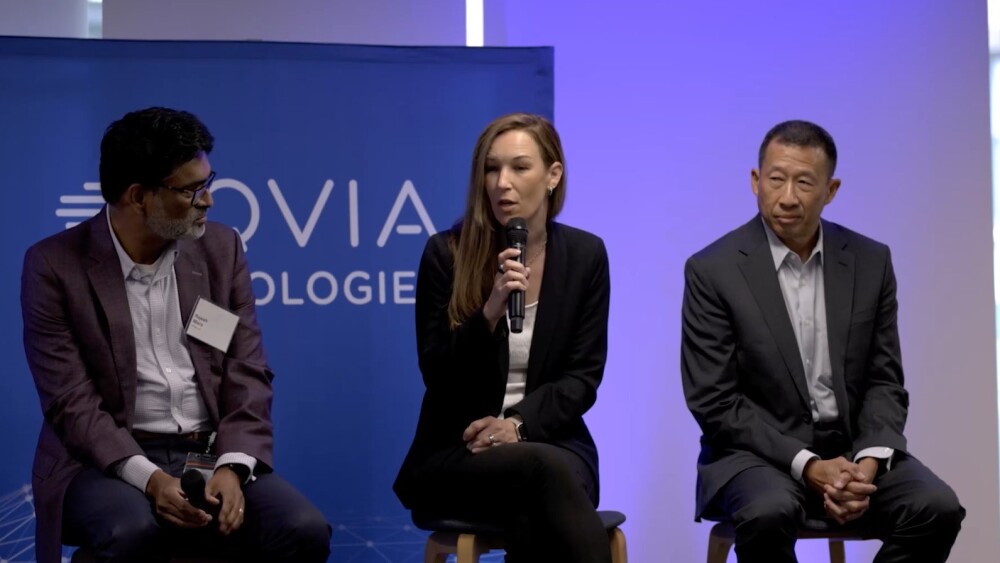ThermoDox is Celsion’s proprietary, heat-activated liposomal encapsulation of doxorubicin for the treatment of primary liver cancer.
–Thesis Supporting the Phase III OPTIMA Study Chosen for the Presidential Selection Lecture by the Academic Committee – – Celsion to Host Symposium on Hepatocellular Carcinoma at International Liver Congress 2018 in April –
LAWRENCEVILLE, N.J., Feb. 12, 2018 (GLOBE NEWSWIRE) -- Celsion Corporation today announced that an abstract discussing the Company’s Phase III HEAT study evaluating ThermoDox® in combination with radiofrequency ablation (RFA) was one of six selected for presentation as part of the lecture of the Presidential Selection at the Korean Liver Cancer Association’s 12th Annual Scientific Meeting in Seoul, South Korea. ThermoDox® is Celsion’s proprietary, heat-activated liposomal encapsulation of doxorubicin for the treatment of primary liver cancer, also known as hepatocellular carcinoma, or HCC. The presentation was given on February 9, 2018, by Won Young Tak, M.D., Ph.D., Professor Internal Medicine, Gastroenterology & Hepatology, Kyungpook National University Hospital Daegu, Republic of Korea, and a lead investigator for the HEAT Study and the Company’s ongoing second Phase III study of ThermoDox® in combination with RFA, the OPTIMA Study.
“RFA duration appears to be a critically important factor in treating patients with ThermoDox®,” said Dr. Tak. “Findings from the HEAT Study suggest that ThermoDox® plus standardized RFA has the potential to significantly prolong the survival of, and perhaps cure, patients with liver cancer. This is a disease state with a high mortality rate and an urgent need for treatment options that can meaningfully improve patient survival. Interest in the HEAT Study and the potential for improved outcomes with ThermoDox® plus standardized RAF remains of great interest to the treatment community, as evidenced by the academic committee’s selection. Validation of this approach would represent a meaningful advance for this potential new treatment option, and the ongoing OPTIMA Study, if successful, would represent a significant step forward toward providing a potential new treatment for patients with HCC.”
The abstract titled, “Phase III HEAT Study Adding Lyso-Thermosensitive Liposomal Doxorubicin to Radiofrequency Ablation in Patients with Unresectable Hepatocellular Carcinoma Lesions,” and Dr. Tak’s discussion, detailed learnings from the Company’s 701-patient HEAT Study and included results from simulation studies and findings from the post hoc subgroup analysis. Dr. Tak noted that key findings from the study and analyses of ThermoDox® plus RFA suggested that the therapeutic effect of ThermoDox® plus RFA may be improved when the RFA dwell time for solitary lesions is greater than or equal to 45 minutes. The HEAT study and post-hoc analyses are published in the October 2017 issue of Clinical Cancer Research, at:
http://clincancerres.aacrjournals.org/content/early/2017/10/10/1078-0432.CCR-16-2433.long.
Developed in consultation with leading primary liver cancer researchers, and statistical and regulatory experts, Celsion is conducting the Phase III OPTIMA Study, a global, pivotal, double-blind, placebo-controlled clinical trial (Clinical Trials.gov NCT021126560) to evaluate the safety and efficacy of ThermoDox® in combination with RFA standardized to a minimum of 45 minutes across all investigators and sites for treating lesions 3 to 7 centimeters, versus standardized RFA alone. Enrollment in the OPTIMA Study at year-end 2017 reached 74% of the 550 patients necessary to ensure that its primary endpoint, overall survival, can be evaluated with statistical significance. The statistical plan for the OPTIMA Study calls for two interim efficacy analyses by the independent Data Monitoring Committee. The Company currently expects enrollment completion during the third quarter of 2018 and the first pre-planned efficacy analysis in the first half of 2019.
Upcoming Symposium at International Liver Congress 2018
Celsion also today announced that it will be sponsoring an HCC symposium on April 12, 2018, at the International Liver Congress™ 2018, in Paris, France. The International Liver Congress is an annual conference put on by EASL (The European Association for the Study of the Liver). The conference is being held from April 11-15 2018 in Paris. Participating in the symposium are liver cancer experts, Riccardo Lencioni, M.D., FSIR, EBIR, former professor at the University of Pisa School of Medicine and Ghassan K Abou-Alfa, M.D., a board-certified medical oncologist, specializing in primary liver cancer (hepatocellular carcinoma), pancreas, gallbladder, and bile duct tumors, at Memorial Sloan-Kettering Cancer Center. Additional details about the symposium will be made available prior to the conference.
“With incidence and prevalence rates of 32 and 114 cases per 100,000, respectively, HCC is an enormous problem in South Korea, the importance of which is reinforced by the Korean Liver Association’s dedication to improving care for patients with this life limiting disease. Selection of the HEAT Study’s findings that ThermoDox®, combined with well controlled RFA, has the potential to be curative and is being investigated in our current OPTIMA Study, compliments the search for medical advances that the South Korean medical community has been recognized for worldwide,” said Michael H. Tardugno, Celsion’s chairman, chief executive officer and president. “Similarly in Europe, the OPTIMA Study, and the data supporting its “intent to cure” thesis, will be presented and discussed by internationally recognized HCC experts, Dr. Lencioni and Dr. Abou-Alfa. We look forward to advancing our Phase III OPTIMA Study and a first look at data early next year.”
About the OPTIMA Study
The Phase III OPTIMA Study is expected to enroll up to 550 patients in up to 70 clinical sites in the United States, Europe, China and Asia Pacific, and will evaluate ThermoDox® in combination with optimized RFA, which will be standardized to a minimum of 45 minutes across all investigators and clinical sites for treating lesions three to seven centimeters, versus optimized RFA alone. The primary endpoint for the trial is Overall Survival, which is supported by post-hoc analysis of data from the Company's 701 patient HEAT Study, where optimized RFA has demonstrated the potential to significantly improve survival when combined with ThermoDox®. The statistical plan calls for two interim efficacy analyses by an independent Data Monitoring Committee.
ThermoDox® has received U.S. FDA Fast Track Designation and has been granted orphan drug designation for primary liver cancer in both the U.S. and Europe. Further, the U.S. FDA has provided ThermoDox® with a 505(b)(2) registration pathway. Subject to a successful trial, the OPTIMA Study has been designed to support registration in all key primary liver cancer markets. Celsion fully expects to submit registrational applications in the USA, Europe and China. The Company believes that applications will be accepted in South Korea, Taiwan and Vietnam, three other large and important markets for ThermoDox® subject to approval in Europe, China or the USA.
About ThermoDox®
Celsion’s most advanced program is a heat-mediated, tumor-targeting drug delivery technology that employs a novel heat-sensitive liposome engineered to address a range of difficult-to-treat cancers. The first application of this platform is ThermoDox®, a lyso-thermosensitive liposomal doxorubicin (LTLD), whose novel mechanism of action delivers high concentrations of doxorubicin to a region targeted with the application of localized heat at 40°C, just above body temperature. In one of its most advanced applications, ThermoDox®, when combined with radiofrequency thermal ablation (RFA), has the potential to address a range of cancers. For example, RFA in combination with ThermoDox® has been shown to expand the “treatment zone” with a margin of highly concentrated chemotherapy when treating individual primary liver cancer lesions. The goal of this application is to significantly improve efficacy.
Celsion’s LTLD technology leverages two mechanisms of tumor biology to deliver higher concentrations of drug directly to the tumor site. The first: Rapidly growing tumors have leaky vasculature, which is permeable to liposomes and enables their accumulation within tumors. Leaky vasculature influences a number of factors within the tumor, including the access of therapeutic agents to tumor cells. Administered intravenously, LTLD is engineered to allow significant accumulation of liposomes at the tumor site at the time of radiofrequency ablation as these liposomes recirculate in the blood stream. The second: When the tumor tissue is heated to a temperature of 40°C or greater, the heat-sensitive liposome rapidly changes structure and the liposomal membrane selectively dissolves, creating openings that release the chemotherapeutic agent directly into the tumor and into the surrounding vasculature. Drug concentration increases as a function of the accumulation of liposomes at the tumor site, but only where the heat is present. This method targets only the tumor and the area related to tumor invasion, supporting precise drug targeting.
About Celsion Corporation
Celsion is a fully-integrated oncology company focused on developing a portfolio of innovative cancer treatments, including directed chemotherapies, immunotherapies and RNA- or DNA-based therapies. The Company's lead program is ThermoDox®, a proprietary heat-activated liposomal encapsulation of doxorubicin, currently in Phase III development for the treatment of primary liver cancer and in Phase II development for the treatment of recurrent chest wall breast cancer. The pipeline also includes GEN-1, a DNA-based immunotherapy for the localized treatment of ovarian and brain cancers. Celsion has two platform technologies for the development of novel nucleic acid-based immunotherapies and other anti-cancer DNA or RNA therapies. For more information on Celsion, visit our website: http://www.celsion.com. (CLSN-LTSL/ThermoDox® CLSN-Optima Study/HCC)
Celsion wishes to inform readers that forward-looking statements in this release are made pursuant to the "safe harbor" provisions of the Private Securities Litigation Reform Act of 1995. Readers are cautioned that such forward-looking statements involve risks and uncertainties including, without limitation, unforeseen changes in the course of research and development activities and in clinical trials; the uncertainties of and difficulties in analyzing interim clinical data, particularly in small subgroups that are not statistically significant; FDA and regulatory uncertainties and risks; the significant expense, time, and risk of failure of conducting clinical trials; the need for Celsion to evaluate its future development plans; possible acquisitions or licenses of other technologies, assets or businesses; possible actions by customers, suppliers, competitors, regulatory authorities; and other risks detailed from time to time in the Celsion's periodic reports and prospectuses filed with the Securities and Exchange Commission. Celsion assumes no obligation to update or supplement forward-looking statements that become untrue because of subsequent events, new information or otherwise.
ThermoDox® is a registered trademark of Celsion Corporation.
Celsion Investor Contact
Jeffrey W. Church
Sr. Vice President and CFO
609-482-2455
jchurch@celsion.com




